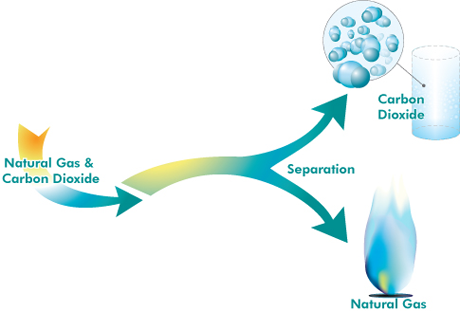
In an election fought to a large degree on climate change strategies, Gordon Campbell has argued that natural gas expansion in B.C.'s northeast will help meet carbon targets mandated by provincial law.
A massive energy proposal put forward by EnCana may test his claim. If current plans for the Cabin Gas Plant receive government approval, the project could pump up to 2 million tonnes of CO2 a year into the atmosphere, according to preliminary Pembina Institute estimates.
It's a prospect the environmental group called "irresponsible" -- and contrary to B.C.'s carbon goals.
Most analysts have pointed to natural gas expansion as the one bright spot in a provincial economy reeling from recession. Right now, B.C. produces one trillion cubic feet of natural gas each year.
But energy giants such as EnCana say untapped gas reserves in the Horn River and Montney basins could double or triple production over coming decades. That would transform B.C. into one of the biggest gas producers in the country -- or the continent. In March, the government boasted of pouring $187 million into Horn River region roads and infrastructure to service the boom.
During the last eight years, oil and gas revenue in B.C. has jumped 60 per cent, according to the BC Liberals platform. Last year, land rights sales for the industry hit a record $2.66 billion.
If all of B.C.'s estimated gas reserves were recoverable, "that would reduce greenhouse gas emissions resulting from coal and other forms of power by hundreds of millions of tonnes," the platform reads.
But it would also require the building of plants which could release large amounts of CO2 into the atmosphere as a byproduct of processing and transporting natural gas. Operations like Cabin Gas Plant.
EnCana a big donor to Liberals
Last November, EnCana submitted a project description for a new processing plant to B.C.'s Environmental Assessment Office. The energy heavyweight is a major giver to the BC Liberals. It donated $255,470 between 2005 and 2008.
The proposed Cabin Gas Plant is located about 60 kilometres northeast of Fort Nelson and could process up to 800 million cubic feet of natural gas each day from the Horn River Basin.
EnCana estimates CO2 levels found in the gas could range between 12 to 14 per cent. The November proposal said the company intended to pursue carbon capture and sequestration -- a relatively new strategy where emitters inject greenhouse gases underground. But an updated project description is less committal.
And a recent public document appears to reject the carbon capture approach.
"In the absence of technical and commercial viability for carbon capture and storage (CCS) options at this time... the plant will be designed to vent CO2," reads a list of frequently asked questions given out at an April 8 public consultation.
Venting refers to the process of depressurizing pipes by releasing emissions into the air. Some environmental groups think it should be eliminated because of its contribution to global warming.
Plant could up BC carbon emissions by three per cent
It would be careless for the government to approve a gas plant that relies on venting, Pembina's Matt Horne told The Tyee. According to preliminary calculations, he estimated EnCana's current proposal could create one to two million tonnes of carbon emissions a year.
That's a significant number, he said, considering the province released 62.5 million tonnes of greenhouse gases in 2006.
"Any increases in the oil and gas sector without a plan to mitigate those greenhouse gas emissions is irresponsible," Horne said.
By law, the province has to reduce carbon emissions to 33 per cent below 2007 levels by 2020. Horne estimated the oil and gas sector would have to cut greenhouse gases by a third to reach its proportional share of the target.
"[The Cabin Gas] project is going in the opposite direction if it doesn't have a solution to those venting emissions," he said.
Calls to Minister of Energy, Mines and Petroleum Resources Blair Lekstrom were not returned by press time.
Venting 'a very common practice': EnCana
EnCana spokesperson Carol Howes said the scale of natural gas expansion in the Horn River Basin will depend on a variety of factors such as commodity prices. The company is looking at several strategies for dealing with CO2, she added.
"Other options have not been eliminated," Howes said. "There's a number of technical and commercial issues that have to be reviewed and addressed."
The Tyee asked Howes to respond to charges from Pembina that venting at the Cabin plant would be "irresponsible," given B.C.'s carbon targets.
"Venting is a very common practice on most plants," she replied. "It's not something new -- it's a process that's been used for a very long time."
The project is still in the public consultation stage. When that wraps up, EnCana will file an application with the provincial government. If the project receives government approval, EnCana expects the Cabin plant to begin operations by late 2011.
The New Democratic Party proposed a $412 million levy on oil and gas sector flaring in its platform. The party recently clarified its position to include all fugitive emissions.
Related Tyee stories:
- BC boosts natural gas industry as prices drop
- The Health Hazard Report the Premier Never Read
Oil and gas study urged safety actions 16 months ago--a surprise to campaigning Campbell. - NDP backpedals on 'flaring royalty,' would charge for all 'fugitive' gas















Tyee Commenting Guidelines
Comments that violate guidelines risk being deleted, and violations may result in a temporary or permanent user ban. Maintain the spirit of good conversation to stay in the discussion.
*Please note The Tyee is not a forum for spreading misinformation about COVID-19, denying its existence or minimizing its risk to public health.
Do:
Do not: